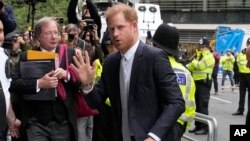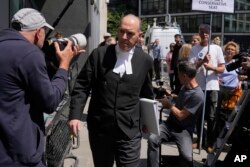Prince Harry finished giving evidence at London's High Court on Wednesday after nearly eight hours of cross-examination in his phone-hacking case against a British tabloid newspaper group, and described the experience as: "It's a lot."
Harry, the first senior British royal to appear in a witness box for more than 130 years, had been questioned for a second day over his allegations that tabloid newspapers had used unlawful means to target him since he was a child.
The prince was more combative in sometimes testy exchanges on Wednesday with Andrew Green, the lawyer for Mirror Group Newspapers (MGN), the publisher of the Daily Mirror, Sunday Mirror and Sunday People, which he and 100 others are suing over allegations of unlawful acts between 1991 and 2011.
Harry, the fifth-in-line to the throne, appeared emotional at the end of his evidence when he was asked by his lawyer David Sherborne how it felt to answer questions about his allegations in court when "the world's media are watching."
Harry exhaled deeply and replied: "It's a lot."
Lawyers representing Harry and other claimants are arguing senior editors and executives at MGN knew about and approved of phone-hacking and instructing private investigators to obtain information by deception.
However, Green said there was no mobile phone data to indicate that Harry had been the victim of phone-hacking and contrasted it with a 2005 police investigation that led to the conviction of the former royal editor at Rupert Murdoch's now defunct News of the World paper.
"If the court were to find that you were never hacked by any MGN journalist, would you be relieved or would you be disappointed?" Green asked the prince.
Harry replied: "That would be speculating ... I believe phone-hacking was on an industrial scale across at least three of the papers at the time and that is beyond doubt.
"To have a decision against me and any other people that come behind me with their claims, given that Mirror Group have accepted hacking, ... yes, I would feel some injustice," he said.
In response to Green's suggestion that Harry wanted to have been a victim, the prince replied: "Nobody wants to be phone hacked."
The last time a British royal was questioned in court was in 1891, when the future Edward VII, Harry's great-great-great grandfather, was a witness in a slander trial over a card game.
MGN, now owned by Reach RCH.L, has previously admitted its titles were involved in phone-hacking — the illegal interception of mobile voicemails — settling more than 600 claims, but Green has said there was no evidence Harry had ever been a victim.
He argued that some of the personal information had come from, or was given with the consent of, senior Buckingham Palace aides.
In reference to one article about him not being allowed to return to combat in Afghanistan, Harry said: "It is suspicious that so much is attributed to a royal source."
In his 50-page written witness statement and in questioning, Harry has said the press had blood on its hands, destroyed his adolescence, ruined relationships with friends and girlfriends, and sowed paranoia and mistrust since 1996 when he was a schoolboy.
He also broke royal protocol to say he believed the British government as well as the media had hit "rock bottom," while his anger at suggestions that his mother, Princess Diana, was a victim of phone-hacking before her death in 1997 was also clear.
Green, who has described some of the prince's allegations as "total speculation," quizzed him in detail over 33 newspaper articles whose details Harry says were obtained unlawfully and many of which related to his relationship with former girlfriend Chelsy Davy.
Harry said intimate details reported about their break-up and arguments about him visiting a strip club had been obtained by phone-hacking, while Green suggested these had been widely reported previously elsewhere.
"This process is as distressing for me as it is for her," Harry said.
As he wrapped up almost seven-and-a-half hours of questioning, Green asked him whether it was the prince's case that his phone had been consistently hacked on a daily basis over a 15-year period.
"It could've been happening on a daily basis, I simply don't know," he said. Asked if there was any evidence he had been hacked, Harry replied: "That's part of the reason why I'm here."






